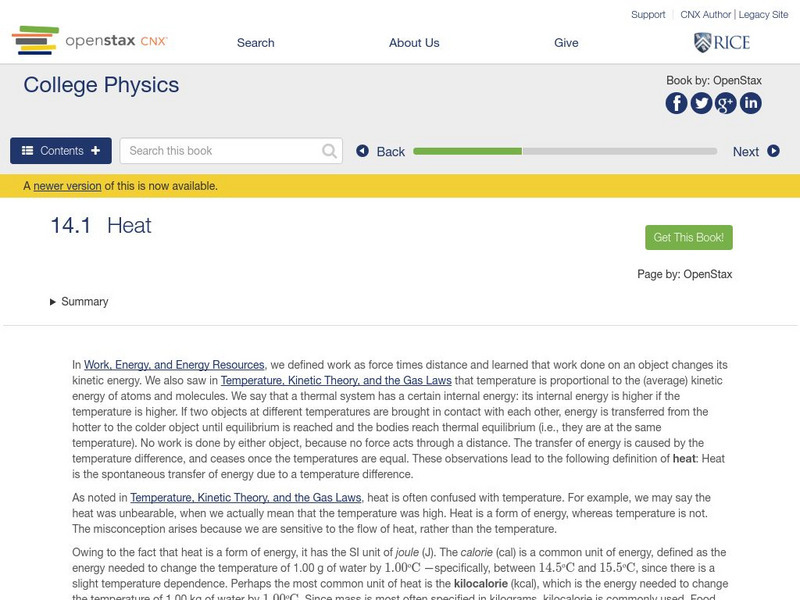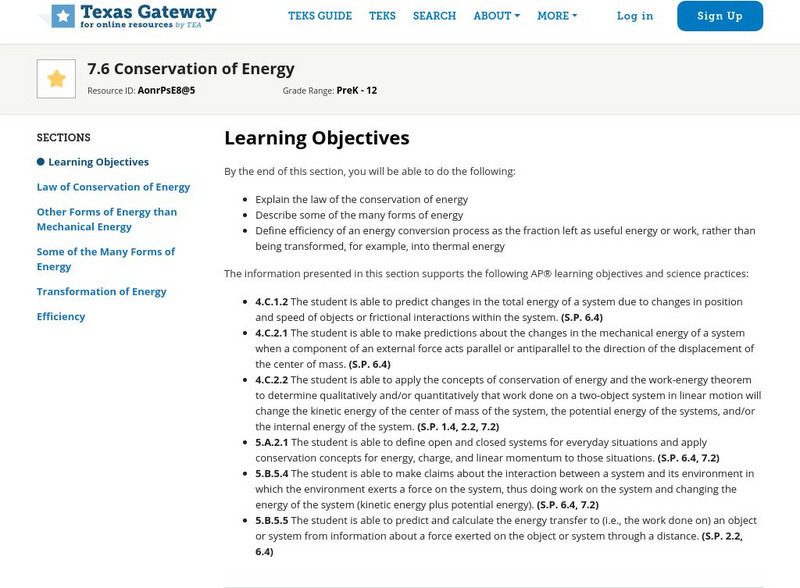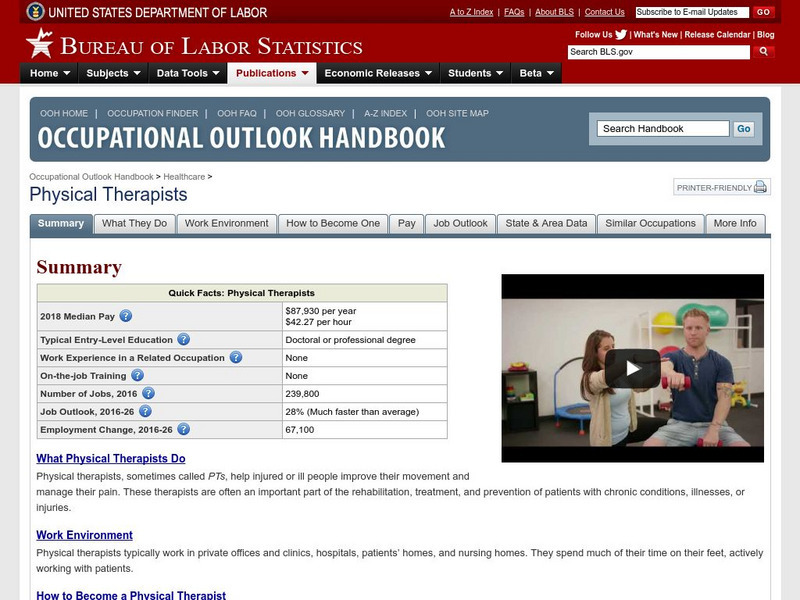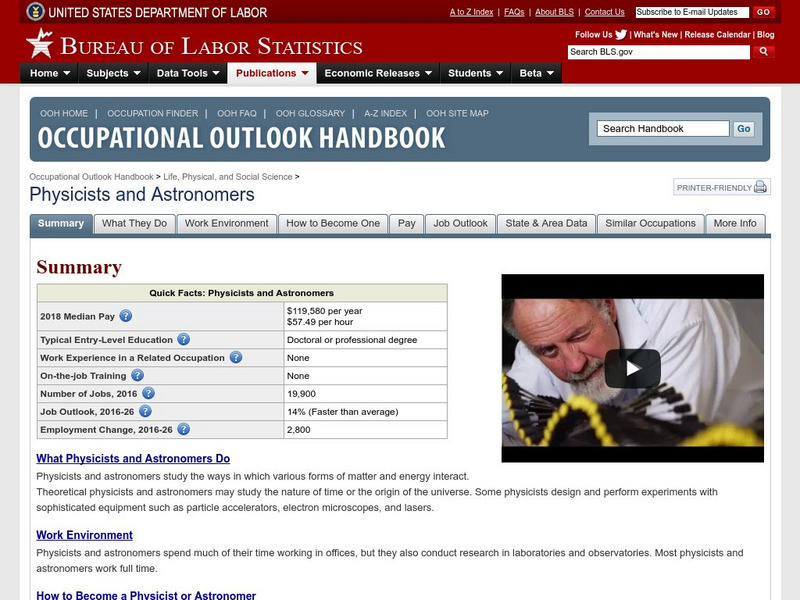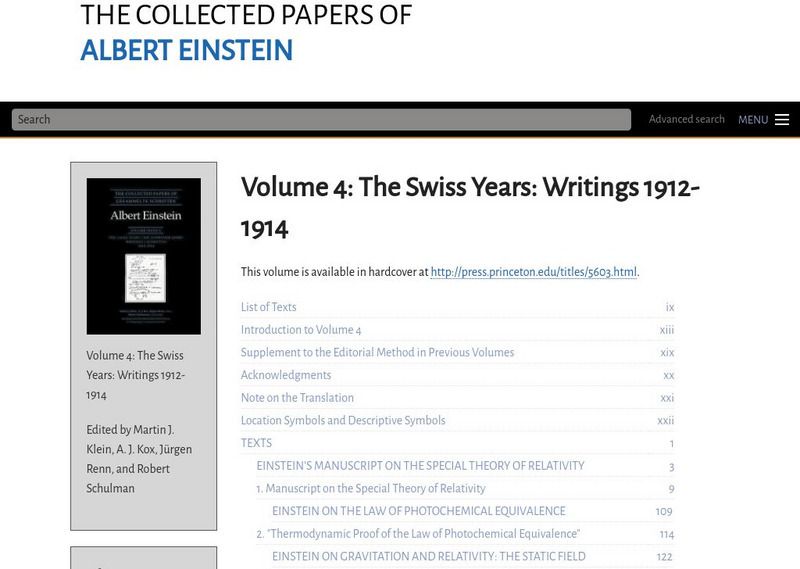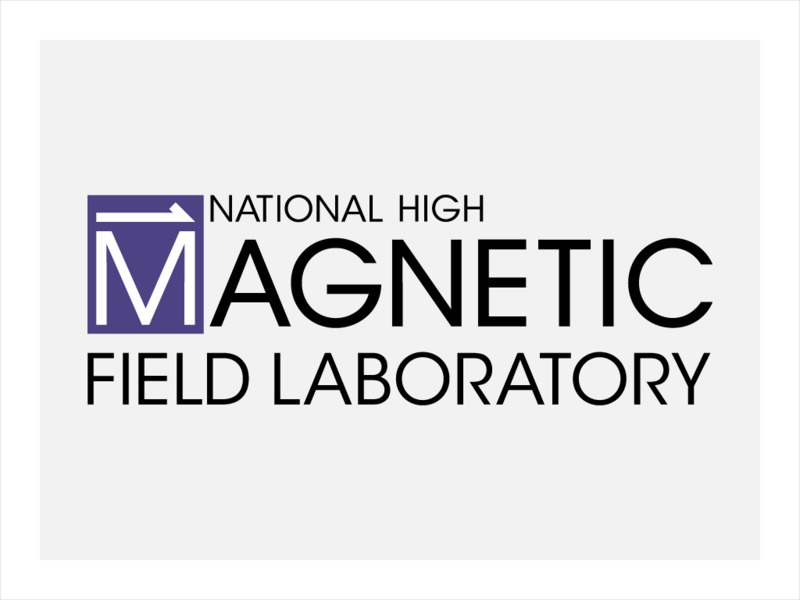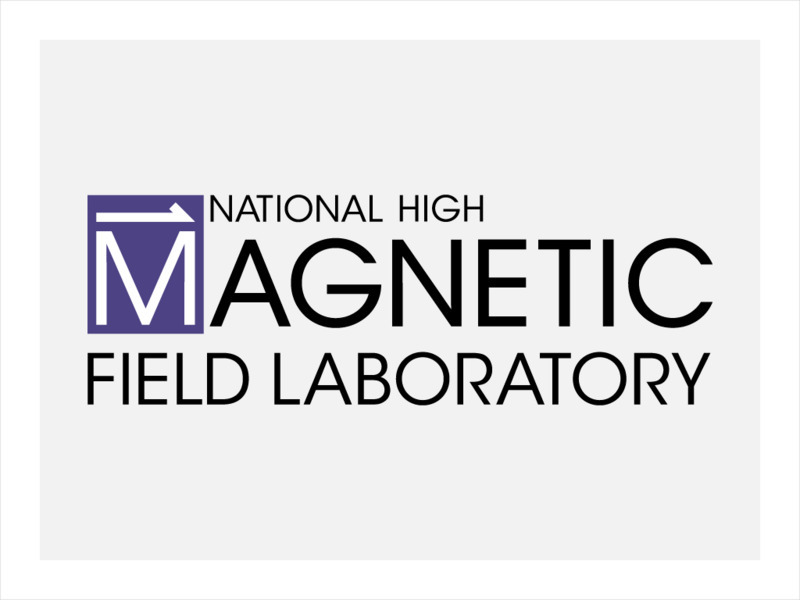OpenStax
Open Stax: College Physics: Heat
In this section of the textbook, find information about how heat and work transfer energy. Also understand how a heat transfer is related to temperature and what mechanical equivalent of heat relates to work and heat transfer. Book can...
Annenberg Foundation
Annenberg Learner: Physics: Early Unification for Electromagnetism
Discusses the connection between electricity and magnetism and the early work of Michael Faraday and James Clerk Maxwell. Electromagnetic interactions were first described by Maxwell. Continues on with a discussion of quantum physics and...
Science Buddies
Science Buddies: Career Profile: Physical Therapist
This career profile from Science Buddies explains what a physical therapist does. Find out the nature of the work, the work environment, the education requirements, and what a physical therapist's daily work looks like. Included are...
Nobel Media AB
The Nobel Prize: The Nobel Prize in Physics 1935 Presentation Speech
The Nobel Physics Chairman made this speech when presenting the Prize to Chadwick. It clearly explains the importance and depth of Chadwick's work. Site by Nobel e-Museum.
Texas Education Agency
Texas Gateway: Rotational Kinetic Energy: Work and Energy Revisited
By the end of this section, you will be able to derive the equation for rotational work, calculate rotational kinetic energy, and demonstrate the law of conservation of energy.
Texas Education Agency
Texas Gateway: Kinetic Energy and the Work Energy Theorem
By the end of this section, you will be able to explain work as a transfer of energy and net work as the work done by the net force and to explain and apply the work-energy theorem.
Open Curriculum
Open Curriculum: Work: The Transfer of Mechanical Energy
Read this illustrated article to help you understand the concept of work in regards to the transfer of mechanical energy.
Texas Education Agency
Texas Gateway: Ap Physics: Conservation of Energy
By the end of this section, you will be able to explain the law of the conservation of energy; describe some of the many forms of energy; and define efficiency of an energy conversion process as the fraction left as useful energy or...
Read Works
Read Works: Passages: Paired Text: "Whom Does He Look Like?"
[Free Registration/Login Required] The paired passages "My Three Sisters" and "Whom Does He Look Like?" have the common theme of physical similarities between family members. Comprehension question sets are available for each separately...
US Department of Labor
Bureau of Labor Statistics: Physical Therapist
What does a physical therapist do? What are the working conditions, training, employment outlook, and earnings? Find out if this jobs for you.
Khan Academy
Khan Academy: Physical Processes: Electronic Structure: Electron Configurations Article
Electron configurations are a simple way of writing down the locations of all of the electrons in an atom. This article describes how this works.
Physics Hypertextbook
The Physics Hypertextbook: Refrigerators
This resource provides a detailed discussion about how refrigerators work. Also includes a history of the invention of refrigerators, and the physics behind how they work.
US Department of Labor
Bureau of Labor Statistics: Physicists and Astronomers
A thorough overview of the careers of physicist and astronomer, covering nature of the work, working conditions, employment information, training requirements, and job outlook.
US Department of Labor
Bureau of Labor Statistics: Science Technicians
Review information about what it's like to be a science technician. Includes details about expected salary and working conditions.
Open Curriculum
Open Curriculum: Rules of Randomness
Discuss methods of working with probabilities and quantum physics in this article.
Libre Text
Libre Texts: Physics: Conservation of Angular Momentum
A few examples of what the conservation of angular momentum is and understand how it works. Challenge comprehension with follow up questions for discussion and problems for solutions.
Texas Education Agency
Texas Gateway: The First Law of Thermodynamics
By the end of this section, you will be able to define the first law of thermodynamics; describe how conservation of energy relates to the first law of thermodynamics; identify instances of the first law of thermodynamics working in...
Texas Education Agency
Texas Gateway: Gauge Pressure, Absolute Pressure, and Pressure Measurement
By the end of this section, you will be able to define gauge pressure and absolute pressure and to understand the working of aneroid and open-tube barometers.
Princeton University
The Collected Papers of Einstein: Volume 4: Swiss Years: Writings 1912 1914
A publication of Albert Einstein's written legacy presented in the original language version with in-depth English language annotation readers can access. This volume focuses on his life and work in Switzerland.
Lawrence Berkeley National Laboratory
Berkeley Lab: The Man, His Lab and Legacy
Learn about the life and work of physicist Lawrence Berkeley.
National High Magnetic Field Laboratory
Magnet Academy: Murray Gell Mann
Murray Gell-Mann is a theoretical physicist who won the Nobel Prize for Physics in 1969 for his contributions to elementary particle physics. He is particularly well known for his role in bringing organization into the world of subatomic...
National High Magnetic Field Laboratory
Magnet Academy: Timeline of Electricity and Magnetism: 1600 1699
The Scientific Revolution takes hold, facilitating the groundbreaking work of luminaries such as William Gilbert, who took the first truly scientific approach to the study of magnetism and electricity and wrote extensively of his findings.
National High Magnetic Field Laboratory
Magnet Academy: Heike Kamerlingh Onnes
Heike Kamerlingh Onnes was a Dutch physicist who first observed the phenomenon of superconductivity while carrying out pioneering work in the field of cryogenics. An important step on the way to this discovery was his success in...
National High Magnetic Field Laboratory
Magnet Academy: Joseph John Thomson
Joseph John Thomson, better known as J. J. Thomson, was a British physicist who first theorized and offered experimental evidence that the atom was a divisible entity rather than the basic unit of matter, as was widely believed at the...
Other popular searches
- Work Physics
- Fluid Work Physics
- Work Physics Incline
- Power Work Physics
- Force and Work Physics
- Experiment on Work Physics
- Work and Energy Physics
- Waves Physics Worksheets
- Energy Work Physics
- Physics Sound Worksheets
- Work Physics Friction
- Work Physics Worksheet
